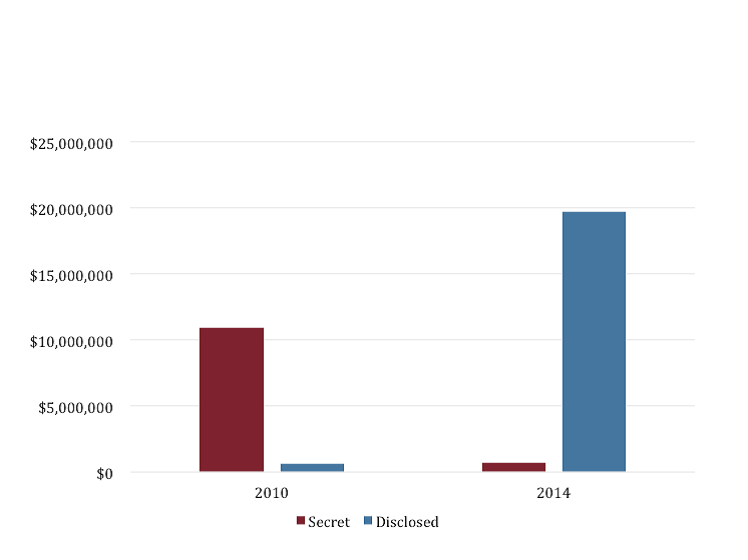Recently two reports have come out that address dark money in Massachusetts politics. Massachusetts Common Cause boasts of Shining a Light: Success of the Massachusetts Disclosure Law. The Brennan Center for Justice offers a darker picture of Massachusetts in Secret Spending in the States.
The differences in the outlook here are at least in part due to differences in methodology, nomenclature, and in focus. But let’s get to the good news from Common Cause and then, because I don’t count the news as all that great, to the problems Common Cause still identifies. I’ll discuss the Brennan Center report more completely another day.
Common Cause reports that outside spending – spending not controlled by candidates or parties, has increased in Massachusetts from $4 million in 2006, to $11.5 million in 2010, to $20.4 million in 2014. But here’s the good news. CC’s “Figure 2: Overall Secret vs. Disclosed Independent” figure shows:

The report states that between 2010 and 2014, the amount of secret money in state elections decreased by 94 percent, from $10,936,787 to $688,147. CC attributes this improvement to the 2014 Disclosure Act, which it supported and also to a change in outside spending brought on by the Citizens United and Speech Now decisions that shifted outside spending away from corporate “electioneering communications” and toward IEPACs.
A particular bright spot for CC was a substantial increase in transparency in information in state legislative campaigns from 2010 to 2014. Nine IEPACS spent about $1.1 million and disclosed their contributors. But two of them, Democrats for Education Reform and Strong Economy Massachusetts, listed as their contributors other dark money organizations. Thus, DFER and SEM remained dark.
According to the Office of Campaign and Political Finance, DFER’s anonymous donors spent $176,734.00 on legislative races in 2014. In 2013, DFER’s ghosts spent just short of $1.3 million supporting John Connolly for mayor of Boston. DFER barely loosened the elastic on the bankroll in 2015, spending only about $2000.00 on Andrea Campbell. In 2016, the few, the proud, the unknown have lobbed $64,347.00 into two senate special elections. If you happen to be the sort of cheeky citizen who believes you should know the identity of the freedom loving benefactors who have spent over $1.5 million to influence our elections, let me publicly scold you for your effrontery. But, I’ll just whisper that DFER is a front for “individual contributors who represented over $20.3 billion in investor money” according to a report on political money backing charter schools by Common Cause New York. Or as the sassy Center for Media and Democracy nicknames DFER, "Hedge Funders for Education Reform.”
SEM only spent $6000.00 in 2014, in favor of Charlie Baker. But then its sister organization, Strong Economy for Growth Inc. put $70,000.00 of untraceable pelf toward the Public Charter Schools for Massachusetts ballot committee in 2015, which the organization used to defray its signature gathering costs of $305,000.00. That kind of money can buy some grass roots! Strong Economy for Growth is an IRC 501(c)(4) organization, meaning it can engage in political activities but need not disclose its contributors. It was formed in 2013 to support Richard Tisei’s congressional campaign, then funneled money to Scott Brown’s senate campaign in New Hampshire. Citizens for Responsibility and Ethics in Washington refers to it as “Strong Economy for Dark Money.”
Speaking of IRC 501(c)(4) money laundering operations, the Massachusetts Fiscal Alliance also earned its place on Massachusetts Common Cause’s Naughty List. MFA exploited a loophole to avoid disclosure requirements by not dedicating fundraising to electioneering communications and since it sent direct mail it didn’t have to disclose its top five contributors, as groups that run TV or print ads are required to do under the Disclosure Act. Thus MFA, which spent $289,055.00 in dark money in 2014, could be funded by even just one wealthy contributor, and the voters would never know. And I can scarcely forsake the reminder that Mass Fiscal earned the coveted 2015 Award for Fraud in Massachusetts Politics for its phony poll on MBTA reform. Common Cause has proposed reforms to require disclosure from organizations like MFA, and legislation to rein them in has already passed the House.
The Disclosure Act has done some good alright, but we need more so that groups like DFER and MFA can join the individual citizen basking in the bright light of accountability. The Brennan Center has some ideas and I’ll get to them soon.

